Study of the Aerodynamic Performance of Pantograph Bowhead with Serrated Lower Surface in the Thermal Management Systems of the High-Speed Train Electrical Devices
Abstract
:1. Introduction
2. 2 Numerical Modeling of the Air Flow Field around the Bowhead
2.1. Transition SST Model
2.2. Two-Dimensional Physical Model Building
2.3. Meshing and Boundary Condition Setting
3. Analysis of the Air Flow Field on the Outer Surface of the Bowhead
3.1. Analysis of the Flow Field Outside the Rectangular Bowhead at Different Flow Rates
3.2. Analysis of the Air Flow Field on the Outer Surface of the Serrated Bow Head
4. Analysis of Unsteady Aerodynamic Characteristics of Bowhead
4.1. Analysis of Aerodynamic Lift of Different Bowhead Structures
4.2. Analysis of Aerodynamic Resistance of Different Bowhead Structures
5. Conclusions
- When the air flows through the bowhead, the air pressure at the windward stationary point increases and the air velocity decreases. Meanwhile, the air near the bow head backflows and mixes with the incoming air, thus producing vortex shedding. With the increase of speed, the frequency of bowhead vortex shedding accelerates and the resistance increases. The average value of the drag coefficient increases with the increase in velocity, and the amplitude of fluctuation of the drag and lift coefficient also increases.
- The optimized serrated groove structure on the lower surface suppresses the separation of the boundary layer and provides conditions for the separated fluid to reattach, and the complete separation bubble is formed in the groove before flowing downward, effectively reducing energy dissipation.
- For the bowhead with the same height of serrated teeth, the effect of reducing aerodynamic resistance is not obvious when the tooth height is 1 mm. The drag of the seven-tooth bowhead with 2 mm tooth height is reduced by 7.9%. The effect of optimizing the five-tooth bowhead is obvious when the tooth height is 3 mm, and the drag is reduced by 9.9% at 350 km/h. The improvement of aerodynamic performance of the bowhead could increase the current collection efficiency and heat dissipation performance of traction drive systems.
- For bowheads with the same number of teeth, the aerodynamic performance of three- and five-tooth bowheads is improved with the increase in tooth height. Seven-tooth bowheads with a certain height increase in tooth height accelerate the phenomenon of sharp vortex shedding at the tip of the serrated teeth, and the aerodynamic performance becomes worse.
- The 5w3h-shaped bowhead has the best aerodynamic performance. Compared with the rectangular bowhead, the running resistance is optimized by 8.6%, 8.7%, and 9.9% at the three speeds, respectively. The drag coefficients are reduced by 8.59%, 8.71%, and 9.77%, respectively. The improvement of aerodynamic characteristics of the pantograph is beneficial in promoting the thermal performance of traction drive systems for high-speed trains.
Author Contributions
Funding
Data Availability Statement
Conflicts of Interest
References
- Xiao, G.; Wu, B.; Yao, L.; Shen, Q. The traction behavior of high-speed train under low adhesion condition. Eng. Fail. Anal. 2022, 131, 105858. [Google Scholar] [CrossRef]
- Xu, H.; Xu, J.; You, Z.; Peng, W.; Zhang, K.; Xu, J. Thermal Simulation of Traction System for High-Speed Train Based on Heat Accumulation. J. Comput. 2012, 7, 1034–1040. [Google Scholar] [CrossRef]
- Bruni, S.; Bucca, G.; Carnevale, M.; Collina, A.; Facchinetti, A. Pantograph–catenary interaction: Recent achievements and future research challenges. Int. J. Rail Transp. 2017, 6, 57–82. [Google Scholar] [CrossRef]
- Benet, J.; Cuartero, F.; Rojo, T.; Tendero, P.; Arias, E. A dynamic model for the study and simulation of the pantograph–rigid catenary interaction with an overlapping span. Appl. Sci. 2021, 11, 7445. [Google Scholar] [CrossRef]
- Carnevale, M.; Facchinetti, A.; Rocchi, D. Procedure to assess the role of railway pantograph components in generating the aerodynamic uplift. J. Wind. Eng. Ind. Aerodyn. 2017, 160, 16–29. [Google Scholar] [CrossRef] [Green Version]
- Song, Y.; Zhang, M.; Øiseth, O.; Rønnquist, A. Wind deflection analysis of railway catenary under crosswind based on nonlinear finite element model and wind tunnel test. Mech. Mach. Theory 2022, 168, 104608. [Google Scholar] [CrossRef]
- Song, Y.; Liu, Z.; Rnnquist, A.; Nåvik, P.; Liu, Z. Contact wire irregularity stochastics and effect on high-speed railway pantograph–catenary interactions. IEEE Trans. Instrum. Meas. 2020, 69, 8196–8206. [Google Scholar] [CrossRef]
- Tur, M.; García, E.; Baeza, L. A 3D absolute nodal coordinate finite element model to compute the initial configuration of a railway catenary. Eng. Struct. 2014, 71, 234–243. [Google Scholar] [CrossRef] [Green Version]
- Bocciolone, M.F.; Resta, F.; Rocchi, D.; Tosi, A.; Collina, A. Pantograph aerodynamic effects on the pantograph–catenary interaction. Veh. Syst. Dyn. 2006, 44 (Suppl. S1), 560–570. [Google Scholar] [CrossRef]
- Li, X.; Zhou, D.; Jia, L.; Yang, M. Effects of yaw angle on the unsteady aerodynamic performance of the pantograph of a high-speed train under crosswind. J. Wind. Eng. Ind. Aerodyn. 2018, 182, 49–60. [Google Scholar] [CrossRef]
- Wu, Y.; Wu, J.Y.; Zheng, J.H. Simulation of dynamic performance of high-speed pantograph based on finite element and aerodynamic models. J. Southwest Jiaotong Univ. 2009, 44, 855–859. [Google Scholar]
- Herbert, W.; Wang, B.H. Development and operation experience of DSA350S high-speed pantograph for ICE. Power Tract. Express 1994, 5, 13–18. [Google Scholar]
- Yao, Y.; Guo, D.L.; Yao, S.B.; Yang, G. Analysis of non-constant aerodynamic characteristics of high-speed pantographs. Comput. Aided Eng. 2012, 21, 1–5+48. [Google Scholar]
- Zhang, L.; Zhang, J.Y.; Li, T.; Zhang, W.H. Study on non-constant aerodynamic characteristics of pantographs at different positions of high-speed trains. J. Mech. Eng. 2017, 53, 147–155. [Google Scholar] [CrossRef]
- Yang, K.; Huang, C.K.; Yu, L. Simulation of the effect of pantograph aerodynamics on the characteristics of train bow network. Comput. Eng. Des. 2014, 35, 3933–3937. [Google Scholar]
- Xiao, Y.G.; Kang, Z.C. Numerical prediction of the aerodynamic noise of the head surface of high-speed trains. J. Cent. South Univ. (Nat. Sci. Ed.) 2008, 39, 1267–1272. [Google Scholar]
- Qi, K.; Yuan, T.C.; Yang, J. Research on pantograph aerodynamic noise reduction of high-speed trains. Comput. Simul. 2019, 36, 173–180. [Google Scholar]
- Yeongbin, L.; Joohyun, R.; Kyu, H.K.; Dong, H.L.; Hyeok, B.K. Experimental studies on the aerodynamic characteristics of a pantograph suitable for a high-speed train. Proc. Inst. Mech. Eng. Part F J. Rail Rapid Transit 2015, 229, 136–149. [Google Scholar]
- Mitsuru, I.; Katsushi, M. Development of Low Noise Pantograph with Passive Lift Suppression Mechanism of Panhead. Q. Rep. RTRI 2000, 41, 177–181. [Google Scholar]
- Langtry, R.B.; Menter, F.R. Transition Modeling for General CFD Applications in Aeronautics. In Proceedings of the 43rd AIAA Aerospace Sciences Meeting and Exhibits, Reno, NV, USA, 10–13 January 2005; pp. 1131–1134. [Google Scholar]
- Menter, F.R.; Langtry, R.B.; Likki, S.R.; Suzen, Y.B.; Huang, P.G.; Völker, S. A Correlation-Based Transition Model Using Local Variables-Part I: Model Formulation. J. Turbomach. 2006, 128, 413–422. [Google Scholar] [CrossRef]
- Robin, B.L.; Florian, R.M. Correlation-Based Transition Modeling for Unstructured Parallelized Computational Fluid Dynamics Codes. AIAA J. 2009, 12, 2894–2906. [Google Scholar]
- Zhou, S. Comparison of numerical simulation results of cylindrical rudder rod winding with different meshing methods. Equip. Manuf. Technol. 2012, 48–49, 81–95. [Google Scholar]
- Lyn, D.A.; Einav, S.; Rodi, W.; Park, J.-H. A laser-Doppler velocimetry study of ensemble-averaged characteristics of the turbulent near wake of a square cylinder. J. Fluid Mech. 2006, 304, 285–319. [Google Scholar] [CrossRef]
- Shen, L.L.; Liu, M.W.; Wu, L.J. Numerical simulation of cylindrical and square column bypass flow at subcritical Reynolds number. Waterw. Port 2014, 35, 227–233. [Google Scholar]
- Bi, J.H.; Yu, H.J.; Ren, H.P. Two-dimensional numerical analysis of stationary square column and cylindrical winding flow. J. Three Gorges Univ. (Nat. Sci. Ed.) 2012, 34, 41–45. [Google Scholar]

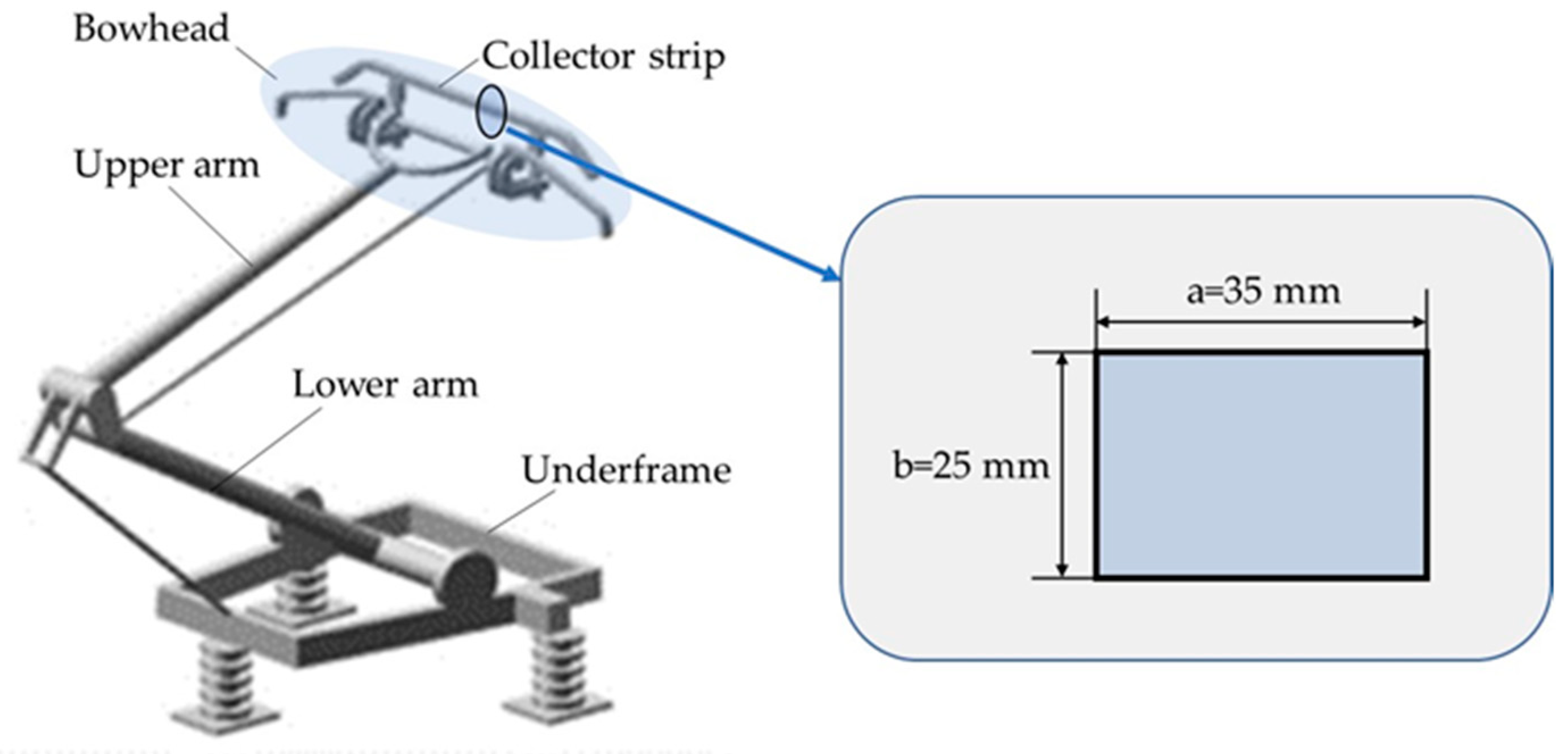




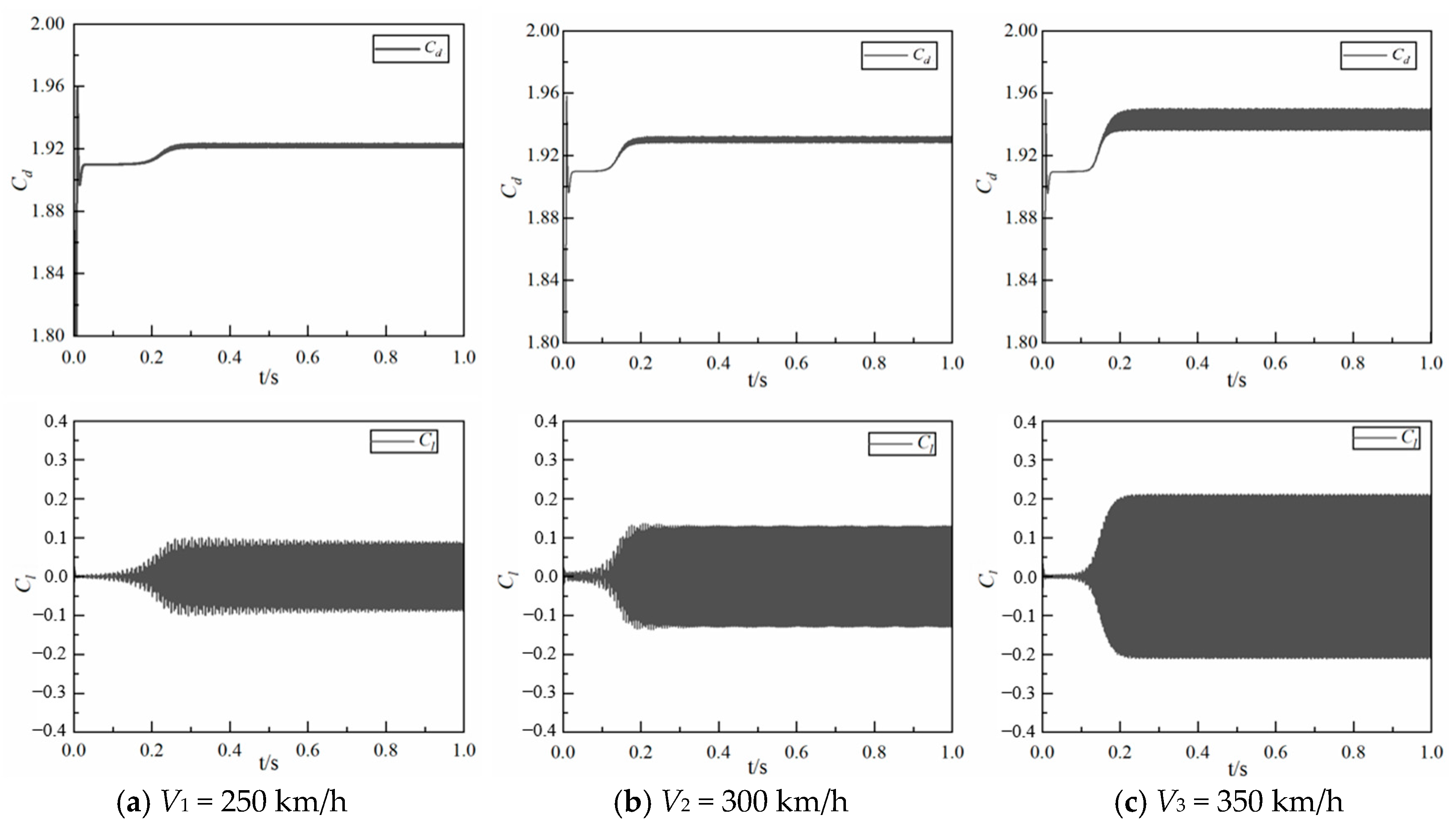
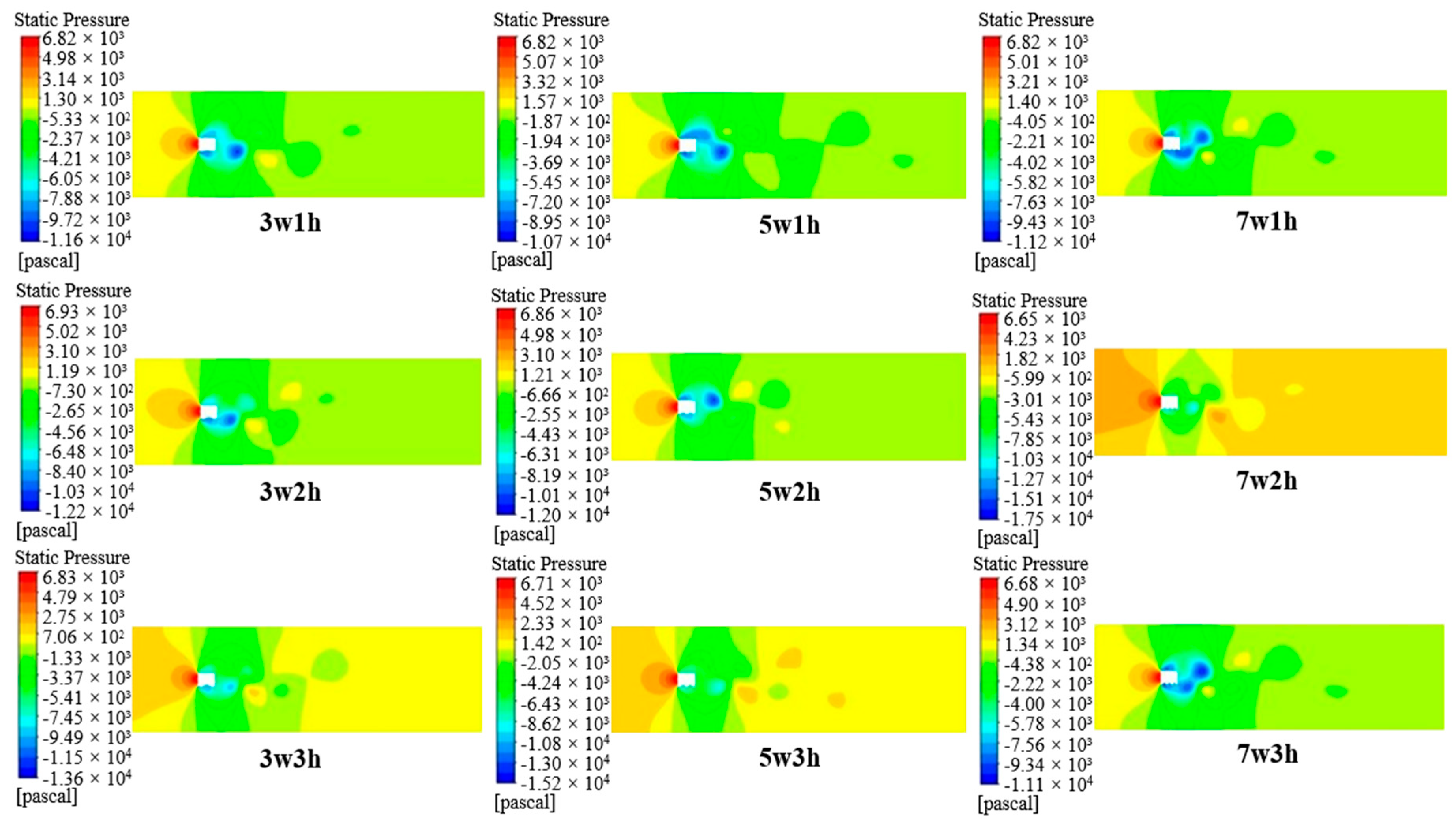

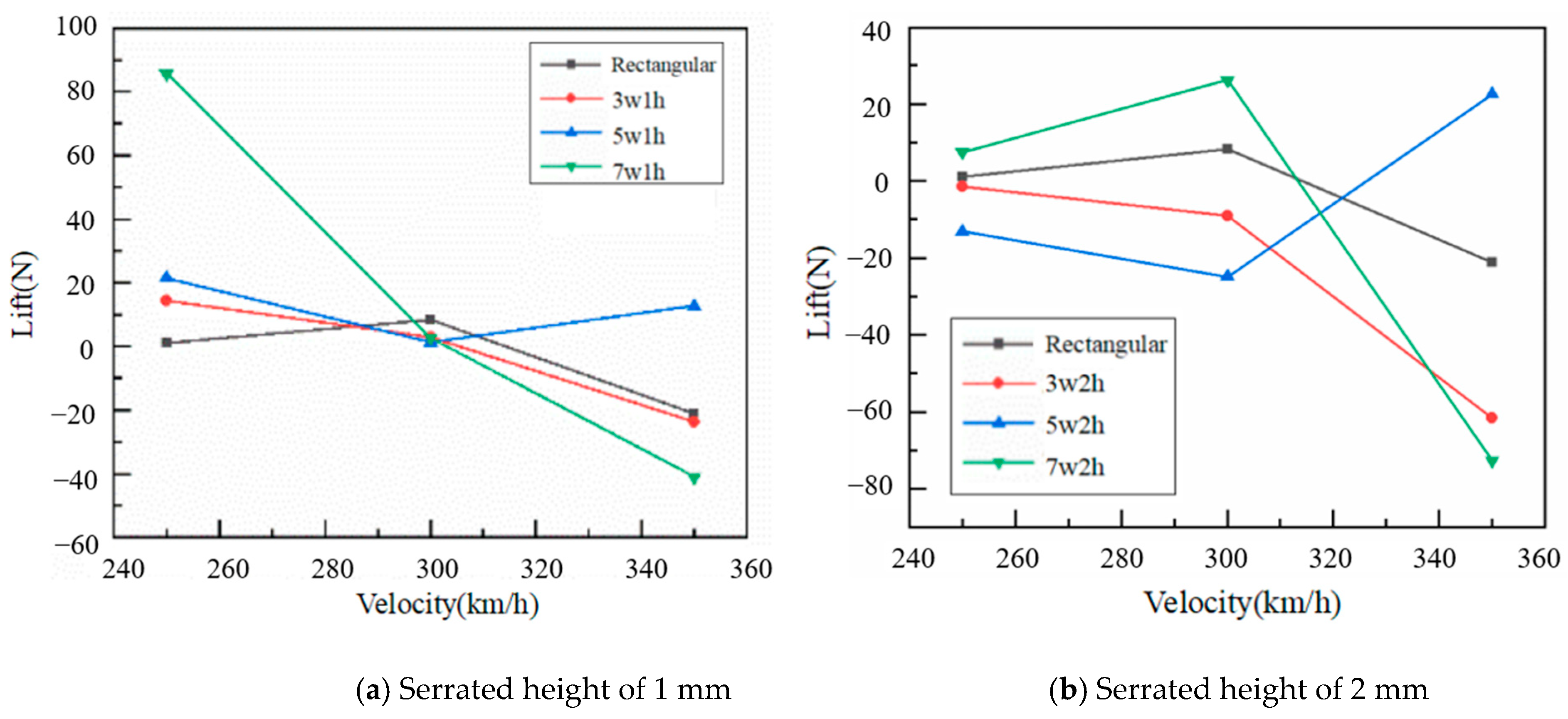
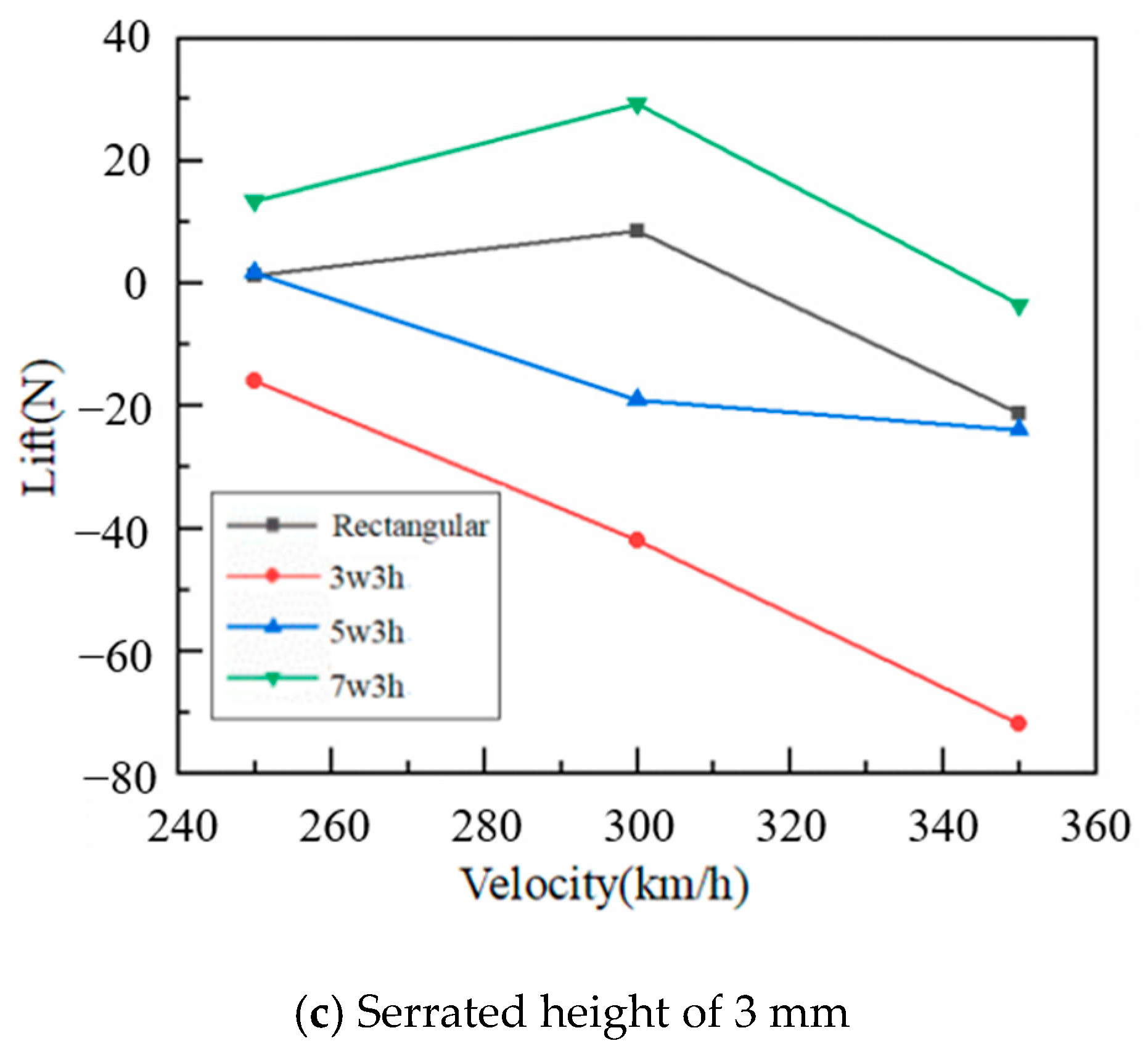
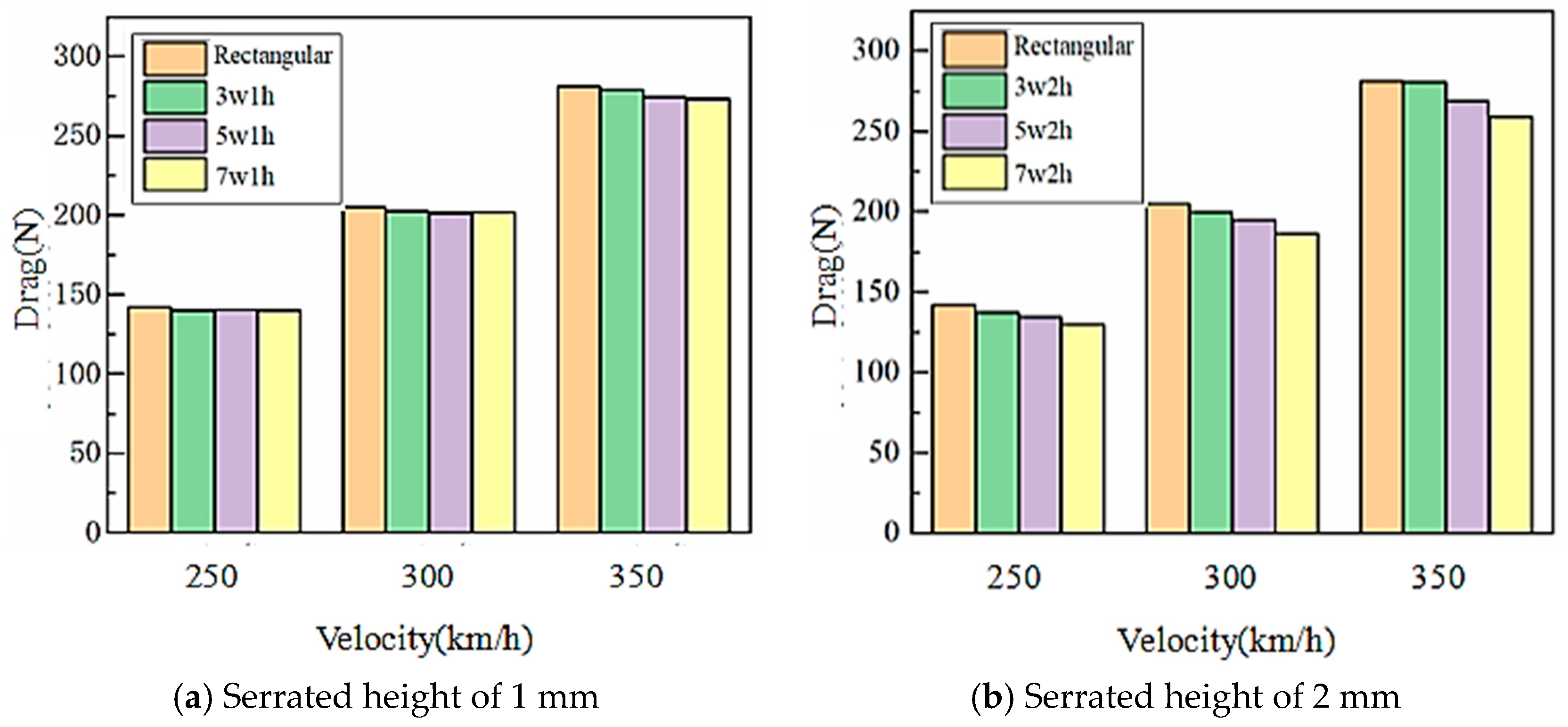
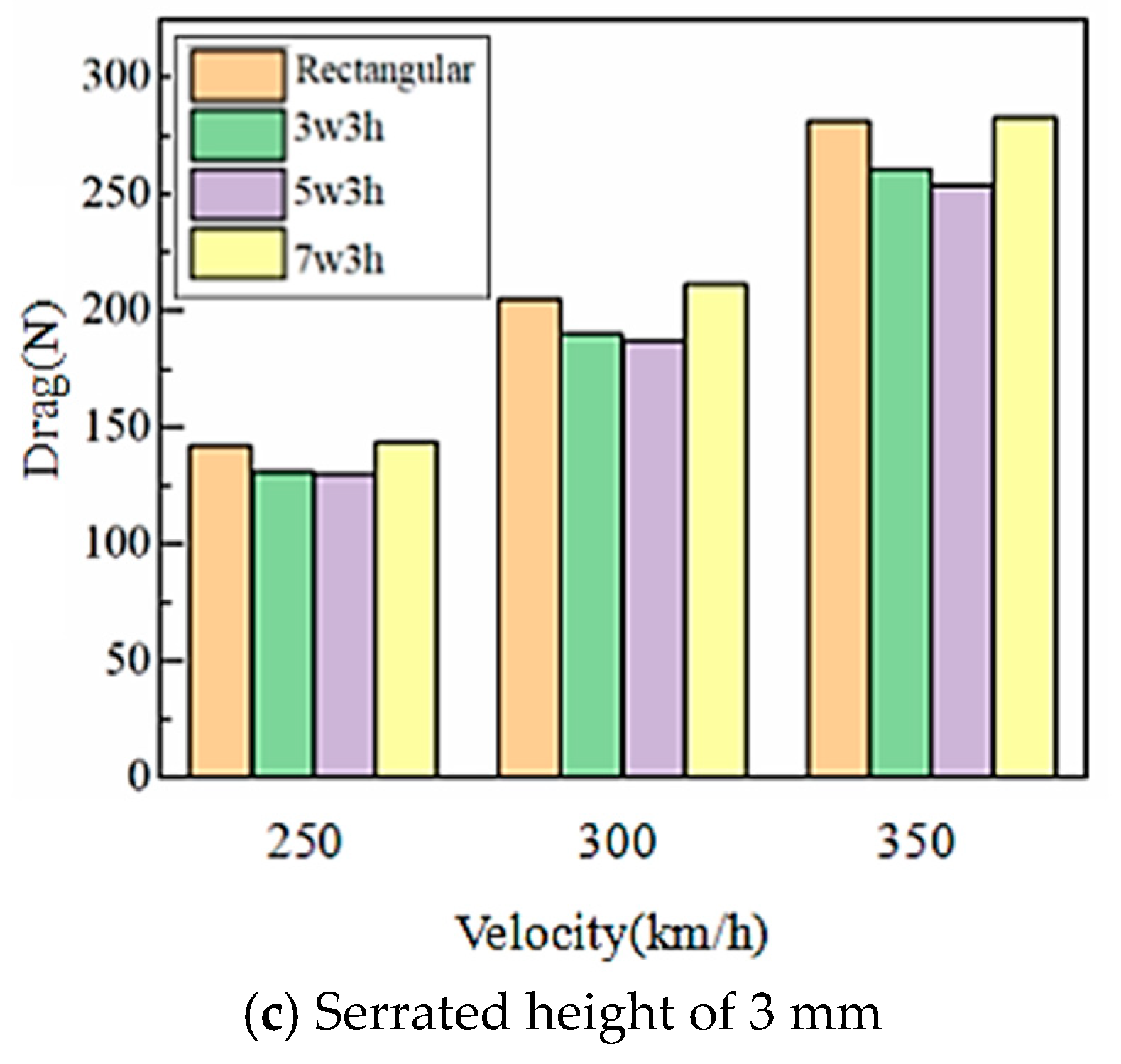
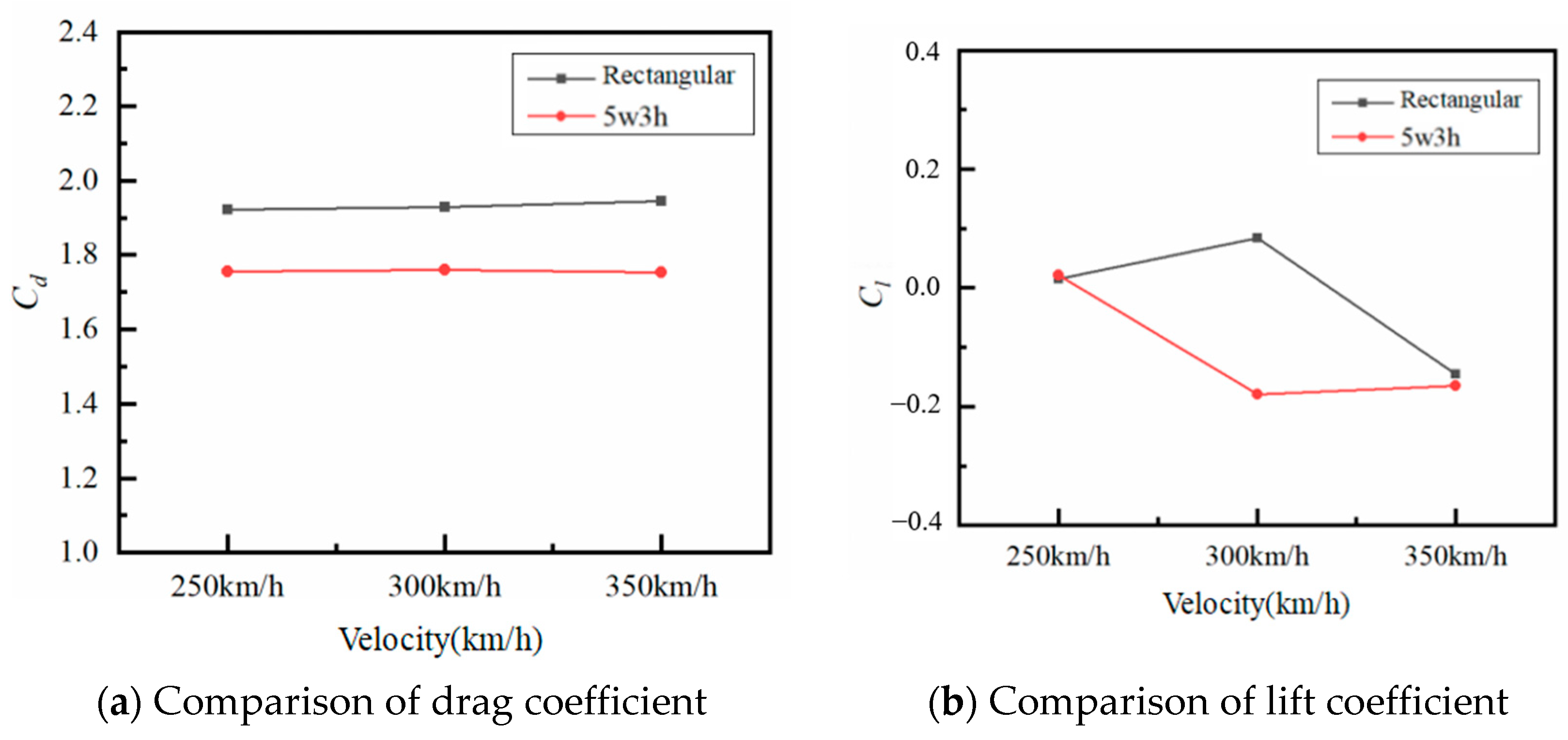
| Grid Number | 50,000 | 70,000 | 150,000 |
| 1.65 | 1.86 | 1.88 |
Disclaimer/Publisher’s Note: The statements, opinions and data contained in all publications are solely those of the individual author(s) and contributor(s) and not of MDPI and/or the editor(s). MDPI and/or the editor(s) disclaim responsibility for any injury to people or property resulting from any ideas, methods, instructions or products referred to in the content. |
© 2023 by the authors. Licensee MDPI, Basel, Switzerland. This article is an open access article distributed under the terms and conditions of the Creative Commons Attribution (CC BY) license (https://creativecommons.org/licenses/by/4.0/).
Share and Cite
Cai, B.; Wu, Z.; Fei, J.; Liu, C.; Guan, Z. Study of the Aerodynamic Performance of Pantograph Bowhead with Serrated Lower Surface in the Thermal Management Systems of the High-Speed Train Electrical Devices. Energies 2023, 16, 2234. https://doi.org/10.3390/en16052234
Cai B, Wu Z, Fei J, Liu C, Guan Z. Study of the Aerodynamic Performance of Pantograph Bowhead with Serrated Lower Surface in the Thermal Management Systems of the High-Speed Train Electrical Devices. Energies. 2023; 16(5):2234. https://doi.org/10.3390/en16052234
Chicago/Turabian StyleCai, Bo, Zhongkai Wu, Jiyou Fei, Chang Liu, and Zhongzhen Guan. 2023. "Study of the Aerodynamic Performance of Pantograph Bowhead with Serrated Lower Surface in the Thermal Management Systems of the High-Speed Train Electrical Devices" Energies 16, no. 5: 2234. https://doi.org/10.3390/en16052234
APA StyleCai, B., Wu, Z., Fei, J., Liu, C., & Guan, Z. (2023). Study of the Aerodynamic Performance of Pantograph Bowhead with Serrated Lower Surface in the Thermal Management Systems of the High-Speed Train Electrical Devices. Energies, 16(5), 2234. https://doi.org/10.3390/en16052234





